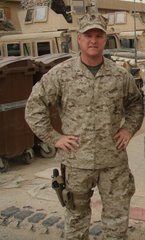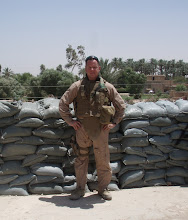I was talking with the Officer in Charge of my unit, the Field history branch this week, Col Michael Visconage. He is currently on a six month assignment in Baghdad working on the Multi-National Corps Iraq (MNC-I) staff as a Historian. I thought people might be interested in his view from a higher headquarters perspective. While the Colonel works the MNC-I operations, I cover the Multi-National Forces West (MNF-W) or the Marine Corps area of operations as their historian.
MNC-I Historian -- The Current Situation:
My job as the Multi-National Corps Iraq Historian is to collect as much data for the military archives as possible so that, once declassified, the events at hand can be studied by researchers, writers, and historians to tell the story of this phase of Operation Iraqi Freedom. To do this, I’ll focus on conducting one-on-one oral history interviews, collecting key documents, and taking photographs. I’ll also keep a lot of notes on the evolving issues to help me focus my collection efforts. My mission is to collect data—I do not have a specific publication I must produce. Because of that, I have no thesis or “outline” in my head that drives my work in a particular pre-determined direction. Collecting a wide range of data for unknown future researches will cause me to collect a broad base of information, not knowing what will be needed, or by whom, in 2 years or 50. I will use my experience as a combat arms officer and historian to guide me to the key issues and decision points.
To bring you up to speed, Multi-National Corps Iraq (MNC-I) is the combat element of the forces we have here. It is commanded by Army LtGen. Raymond Odierno (3 stars). Multi-National Force Iraq (MNF-I) does not have combat forces, but is the senior HQ that coordinates the overall strategy and cross-coordinates the military and governmental issues. General David Petraeus (4 stars) heads MNF-I. MNC-I and MNF-I work very closely and occupy the same HQ building for many of their functions. They plan in concert and collaborate on the plans for prosecuting the war. Below the MNC-I level the country is broken into several regions that are under the control of division-size elements. This is essentially a decentralized fight from a tactical standpoint, as each area faces a different variation of the Anti-Iraqi Forces (AIF).
I’ve been fortunate enough to have a successful initial interaction as the MNC-I Historian for this first six weeks. The core element of the MNC-I staff is the Army’s III Corps, based in Ft. Hood, TX. Most of the senior staff officers are in their late 40’s and are active-duty colonels. Most have been to Iraq before—many as battalion or brigade commanders. They know the fight and have a unique level of cohesion, talent, professionalism, and, yes, a sense of humor (in that dry kind of way that professional colleagues have). There is also a uniform respect for, and confidence in, the ability of the senior commanders here—a critical element for success.
Like any organization, they have a corporate culture. One of the most important jobs of a new-comer who wants to be effective can do is to pay attention to that culture and slowly work at successfully establishing themselves in the context of that culture (usually as being capable, professional, reliable, etc.). For a historian, this is critical and is often the reason why a historian can “fail” in their mission (or at least be ineffective). In this way military and civilian organizations share a common theme – having people skills is a big first step towards success.
Layered on this core Army team is an additional personnel plus-up with “individual augmentees” (IA’s) which add 30-40% more to the team strength. IA’s are guys like me who are on a separate rotation calendar than the III Corps staff and fill a variety of billets that fill out the joint/coalition command structure. They are from all specialties and all services, as well as a variety of our allies (UK, Australia, Poland, South Korea, etc.—30 coalition countries all told). Together, this makes up the MNC-I staff. Overall I’m very impressed with this team. If we are not successful at the end of the day here in Iraq, it won’t because we didn’t send the “A” team.
Being a historian continues to be a position of unique access in terms of gaining a view of all aspects and dimensions of a very complicated situation. After six weeks I probably have a reasonable appreciation for 40-50% of it. Just coming to an understanding of the organizational structure is a big task. After gaining some degree of command support for the historical mission, gaining access to the key commanders and staff is the next step. If they don’t allow you periodic opportunities to meet with them or attend key meetings, you’re dead in the water. The final piece is mobility—the access to transportation around to the different operating areas in order to get a sense for the overall picture.
One key significant historical highlight since my arrival has been the completion of the “surge” of forces. Even thought it started in February, this has been a process that was intended to take several months simply because moving that number of troops and equipment doesn’t happen at the snap of one’s fingers. This has brought an additional five brigades to Iraq—over 20,000 troops. It has allowed the Baghdad security plan (Operation Fardh al Qanoon) to proceed as planned and the coalition has gone into areas that have been left too long to the bad guys.
The surge has represented a new strategic direction, one distinctly different from the approach of the last 12-18 months. Our press to turn over the fight to the Iraqi Security Forces (ISF) and move coalition forces back to an over watch role was not producing results. The Fardh al Qanoon calls for putting security back at the top of the list of priorities. Militarily, coalition forces clear, control, and retain areas, teaming with the ISF to maintain a presence in neighborhoods. This has meant pushing soldiers and Marines out to Forward Operating Bases, Combat Outposts, and Joint Security Stations as opposed to centralizing them on large bases.
The current operation also aims to give the ISF and Government of Iraq some breathing room to continue to mature and fully assume full responsibility for security and governance. This is no easy task. The forces of sectarianism, insurgents, and influence from neighboring nations are just a few very challenging elements at play.
So far I’ve been able to visit the UK forces in the far south at Basrah. This is a dominant Shi’ia area, so there is little factional fighting, but plenty of action focused against the Brits by the Shi’ia militias that the open press has suggested are Iranian-backed. I’ve also been to the headquarters for the Multi-National Division North (MND-N), based just outside of Tikrit. The U.S. Army division at the head of MND-N has a broad span of geography and challenges to manage, including Sunni-Shi’ia factional fighting, Al Qaeda in Iraq (AQI) influence, oil production levels in Kirkuk, and the Kurdish role in Mosul. The areas that are bad are a constant threat and there is little opportunity to build “hearts and minds”. They also have areas that are calm and are making real economic improvements and reasonably stable (mostly the Kurdish areas).
Saturday, July 7, 2007
Subscribe to:
Post Comments (Atom)


3 comments:
Very cool job. I am currently the PAO for a composite (30 cadets) CAP-USAF Aux squadron and was thinking of taking on the Historian job as well. Who will ever know if no one write it down!
If you send your email I'll send the Squadron New Mag.
Dear Marines: I hope you'll strongly support the congressional campaign effort of Lt. Col. William T. Russell against John Murtha in PA's 12th District. Russell needs your support. You can find Russell's web site at: http://williamrussellforcongress.com.
If every Marine offers even a ten-dollar contribution to Russell, he will win this race. His campaign manager is Larry Stiles (USMC, VietNam era). I write almost daily about the Russell Campaign, emphasizing the strategy and tactics that will lead to victory. I invite you to visit as often as you'd like at: http://stevemaloneygop.blogspot.com.
You can sign up for "Bloggers 4 Russell" either by leaving me a commnet on my site or by e-mailing me at TalkTop65@aol.com. Many Marines are involved in this effort (and many Army types). Please join our effort. God belss and good luck.
steve maloney
http://stevemaloneygop.blogspot.com
Nach meiner Meinung lassen Sie den Fehler zu. Ich kann die Position verteidigen. Schreiben Sie mir in PM, wir werden umgehen. cialis rezeptfrei levitra wirkungsdauer [url=http//t7-isis.org]levitra online[/url]
Post a Comment